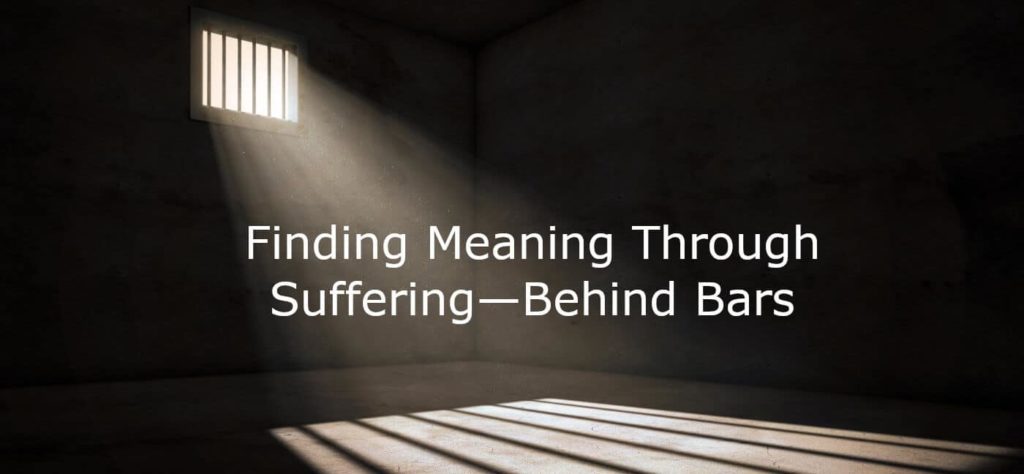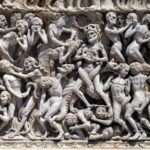Finding Meaning Through Suffering—Behind Bars
We learn about ourselves in extremities. Life becomes a laboratory of soul-making when we seek meaning in an otherwise harsh and empty existence.
I recently began teaching social ethics and moral philosophy at a prison. You can’t avoid the spiritual dimension in a place like that. What I found was a rigorous pursuit of meaning. The ethical, the moral, and the spiritual blend into one hunger. As part of this program, qualifying inmates can take courses toward a General Studies Associate’s Degree, which puts them on a better educational footing once they are released.
I haven’t asked any of them why they are there or for how long, but they’ve shared bits and pieces. Most of their stories involve violence to one degree or another, including violence done to them while inside. A younger student told how when he first went in he tried to be upbeat and kind, literally giving one needy inmate the shirt off his back. But some quickly saw this as weakness and took advantage. He learned the hard way that such an attitude in prison would only bring suffering. Now he felt hardened and self-protective. I could tell he missed the young man he was before he had entered.
Experiences vary, but the search is similar
In this class we’ve surveyed several moral theories and philosophers. Of particular interest at the beginning was Friedrich Nietzsche and his unabashed embrace of suffering. Here, they said, was a man they could relate to, one who recognized that in a world of unremitting anguish one could either lie down and succumb or stand tall and integrate the pain into one’s character. The enthusiasm for Nietzsche was immense—until we discussed his idea of eternal return, which states that your affirmation of life must be so total, with no wish for another world to save you, that you would be willing to live your whole life over and over again forever.
In response, one man said that over the years he’s spoken to the wisest inmates and asked each if they’d be willing to return to prison all over again if that was the only way to learn the wisdom they’ve gained inside. None of them, he said, have been able to answer that question one way or the other.
A laboratory of soul-making prison may be, but is it always worth the price? Are life’s most painful experiences worth the cost as long as we learn something? Would we do it over again rather than be deprived of those treasures that have made us who we are, no matter how terrible? Only the individual can answer this in the depth of their hearts. One student mentioned Jewish writer Viktor Frankl, who attested that those who survived the Holocaust with their minds intact could only have done so by finding meaning in their suffering. But those who couldn’t succumbed more easily to that ravaging. This inmate remained adamant that meaning is the key to defeating suffering.
But I pushed back and said that this might serve well as a personal mantra but can we really impose it on others? Isn’t some suffering purely harmful? Suffering that psychologically and spiritually destroys people? Who are we to insist that everyone always has the capacity to do this? Is there some cosmic law which states that all suffering has some hidden meaning attached to it? Perhaps it is wrong to say that corrosive suffering must always be meaningful, since this could serve as a justification for inflicting it on others. We went back and forth but the man refused to budge. This was how he had survived in prison. There had been no other way.
Doing time… takes time
One of the things that has struck me most intensely since teaching in the prison is how time functions there. Many have told me that time moves excruciatingly slowly inside, especially at the beginning. There’s too much time to think. On the outside we experience the opposite — there is never enough time or space to engage in the kind of reflection that heals our wounds and expands our worlds. And yet prisoners experience the weight of too much contemplation. We all need to disengage the conscious mind at times through embodied tasks and experiences. We can have more self-awareness than is good for our emotional health.
I see this happening with the inmates as we wrestle with moral thinkers and dilemmas. For them, our class is not merely an intellectual exercise or a requirement for a degree but the very materials of their own stories. They are reaching for a spiritual, rational, and physical wholeness that is vital to the human experience. Each one labors under the weight of the suffering they caused and the suffering inflicted on them in this place, a place that communicates with every brick, bar, and guard that meaning from hardship is never cheaply won.
Perhaps, in the end, we who are not confined to prison differ from those who are, mainly because we have more time and space to distract ourselves from the unavoidable task of making meaning.
Jacob Baker is a Ph.D. candidate in Philosophy of Religion and Theology at Claremont Graduate University in California and teaches ethics, religion, and philosophy at Utah Valley University.




